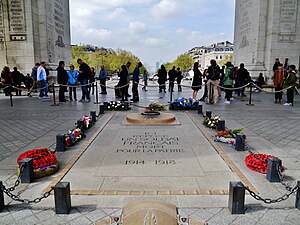| Tomb of the Unknown Soldier | |
|---|---|
Tombe du Soldat inconnu | |
| France | |
 | |
| For the commemoration of all soldiers who have died for France throughout history | |
| Unveiled | 11 November 1920 |
| Location | 48°52′25.6″N 2°17′42.1″E / 48.873778°N 2.295028°E |
・ ICI ・ REPOSE UN SOLDAT FRANÇAIS MORT POUR LA PATRIE — ・ 1914 ・ 1918 ・ (HERE RESTS A FRENCH SOLDIER WHO DIED FOR THE FATHERLAND, 1914–1918) | |
The Tomb of the Unknown Soldier (French: Tombe du Soldat inconnu) holds an unidentified member of the French armed forces killed during the First World War, to symbolically commemorate all soldiers who have died for France throughout history. It was installed in Paris under the Arc de Triomphe on 11 November 1920, simultaneously with the interment of a British unknown soldier in Westminster Abbey, making both graves the first examples of a tomb of the Unknown Soldier, and the first to honour the unknown dead of the First World War.
The burial site, surrounded by black metal posts linked together by chains, consists of a slab of granite from Vire on which is inscribed the epitaph: Ici repose un soldat français mort pour la Patrie, 1914–1918 ("Here rests a French soldier who died for the Fatherland, 1914–1918"). In 1923, an eternal flame was added, rekindled every day at 6:30 pm. After World War II, a bronze shield embellished with a sword engulfed in flames, offered by the Allies to the glory of the French armies and in memory of the liberation of Paris, was installed at the foot of the tomb.
The expression Dalle sacrée ("Sacred slab"), popularized by General Weygand, is used by associations of veterans to designate the tomb and its flame.[1] The monument is guarded on a permanent basis by a specialized unit of the National Police.
- ^ Weygand, Maxime (1932). "Le 11 novembre". Archived from the original on 16 November 2022. Retrieved 16 November 2022.